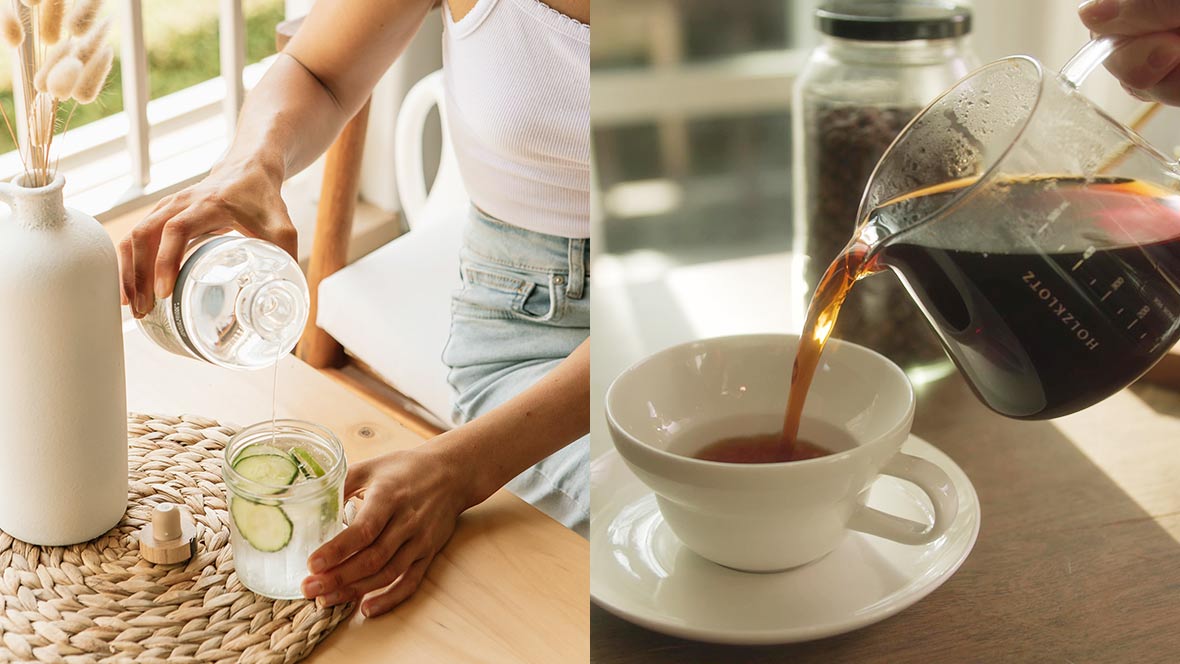
#2 Am I Hydrated Enough?
20221102
Everyone must have heard at least once that “8 cups of water a day keeps you healthy.” This slogan originated from WHO’s recommendation to take in 2 liters of water a day, including moisture in beverages and food. Therefore, you don’t have to drink all eight cups of water as long as you eat fruits and vegetables. However, the water intake of Korean people was found to be even less than half of the advised level. LBLL’s research on the lifestyle of today’s women discovered that Korean ladies drank 5.1 cups of water a day, while the global average was 5.6 cups. Korean women turned out to be less hydrated than those in the US or Singapore
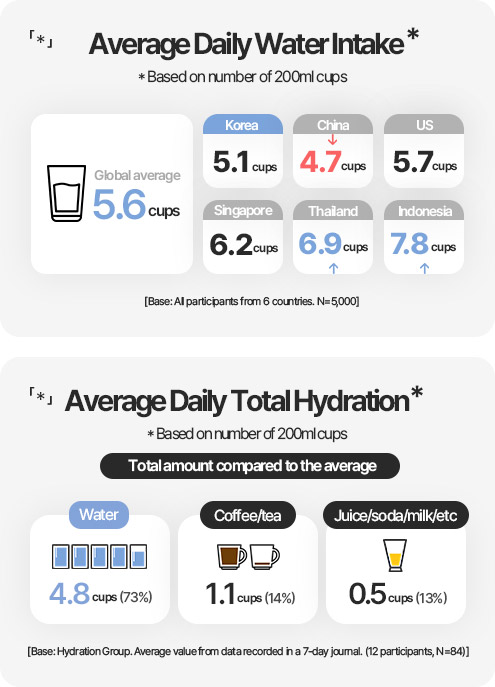
*Based on number of 200ml cups
Global average5.6cups- Korea : 5.1cups
- China : 4.7cups
- US : 5.7cups
- Singapore : 6.2cups
- Thailand : 6.9cups
- Indonesia : 7.8cups
One can easily come across interviews in articles where celebrities confess that they manage their health and skin by hydrating. A portion of the participants (mostly college students)* of LBLL’s research also considered hydration as the most important factor for skin dryness. They answered with “drinking water” as an obvious solution for replenishing their thirsty skin. How then are those who believe they are hydrating well actually doing?
Among the participants of the LBLL research, the *Hydration Group believed that they were sufficiently hydrated in normal days. The truth was that their water intake was at an average level. Out of 6.6 cups of water, the daily average, 14% was coffee or tea and they only drank 4.8 cups of pure water.
*Hydration Group: Participants who believed that hydration affects skin dryness.
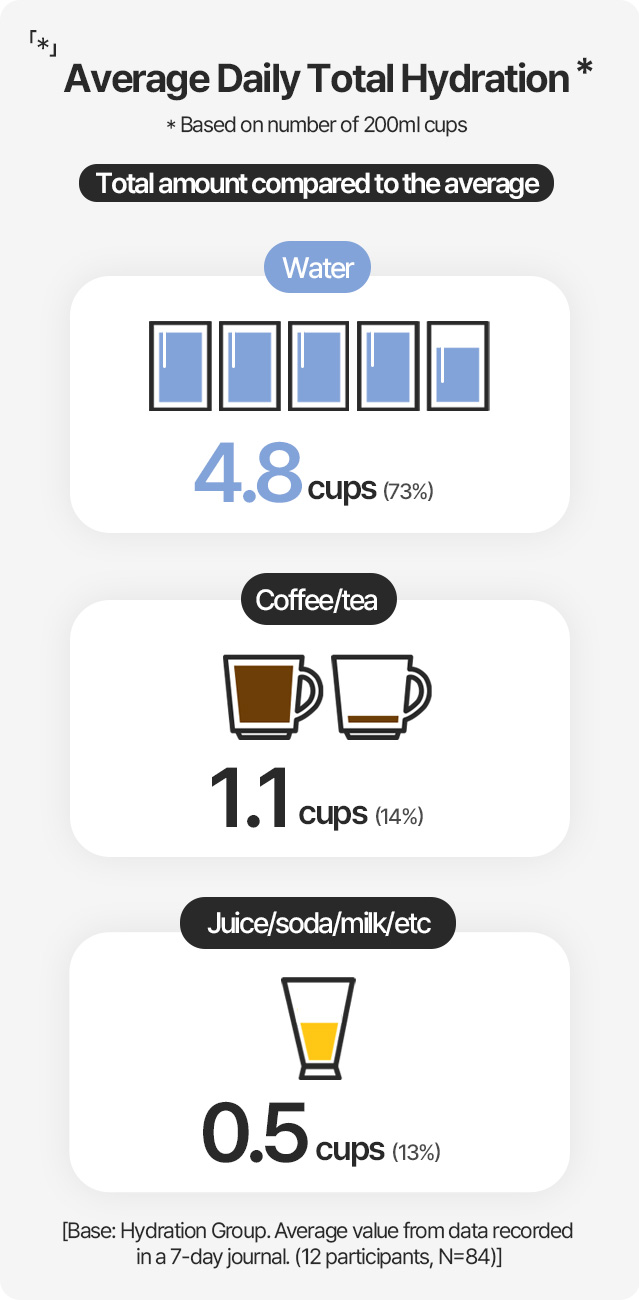
*Based on number of 200ml cups
Total amount compared to the average- Water : 4.8cups(73%)
- Coffee/tea : 1.1cups(14%)
- Juice/soda/milk/etc : 0.5cups(13%)
People understand the importance of hydration but choose coffee or other beverages without really noticing while working or doing school projects. These alternatives actually reduce
the intake of pure water.
The caffeine in coffee or coke also influences the quality of sleep.
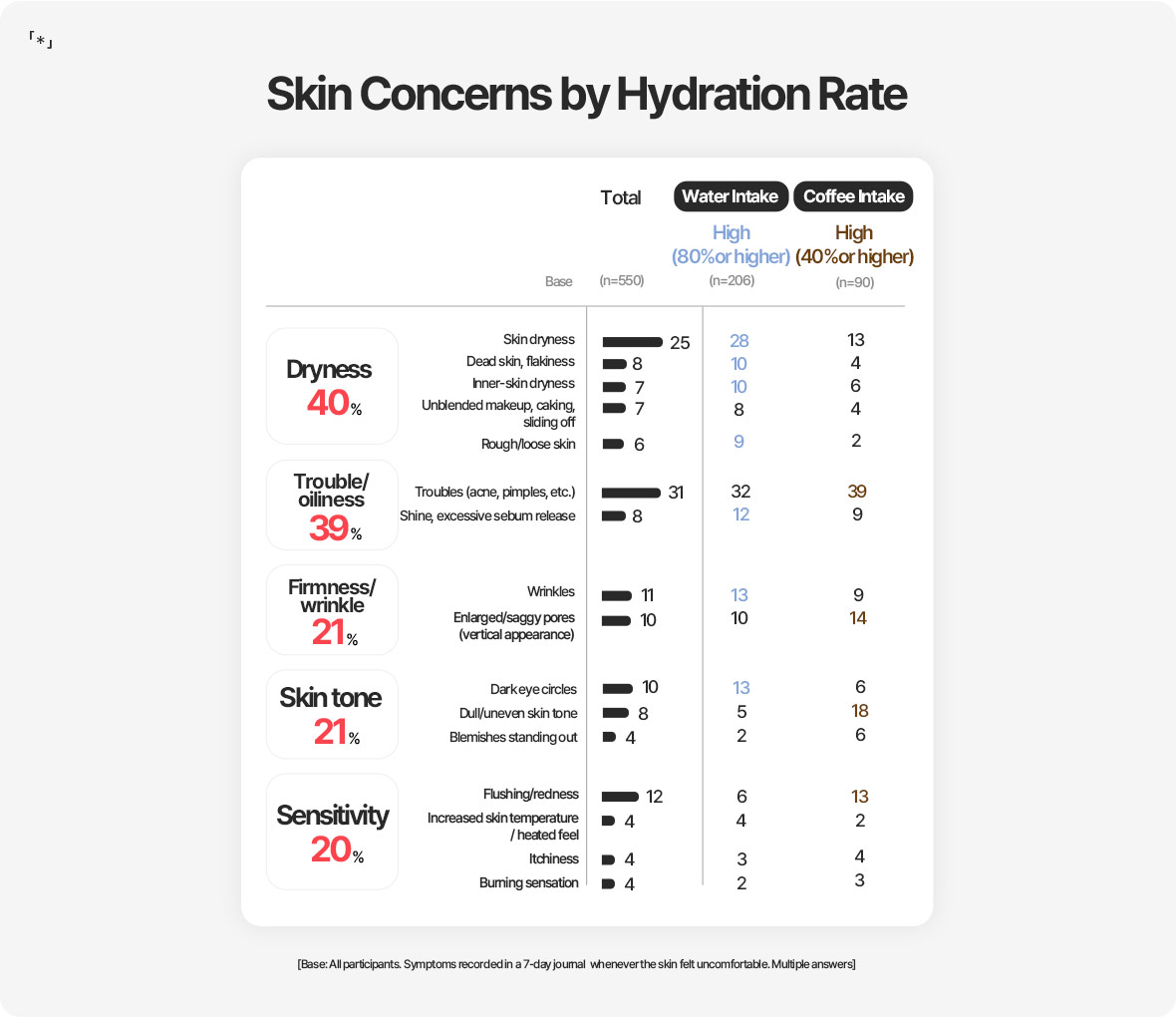
[Condition] Water Intake 80% or higher, Coffee Intake 40% or higher
-
Dryness: 40%
- Skin dryness : Water 28 / Coffee 13 / Total 25
- Dead skin, flakiness : Water 10 / Coffee 4 / Total 8
- Inner-skin dryness : Water 10 / Coffee 6 / Total 7
- Unblended makeup, caking, sliding off : Water 8 / Coffee 4 / Total 7
- Rough/loose skin : Water 9 / Coffee 2 / Total 6
-
Trouble/ oiliness: 39%
- Troubles (acne, pimples, etc.) : Water 32 / Coffee 39 / Total 31
- Shine, excessive sebum release : Water 12 / Coffee 9 / Total 8
-
Firmness/ wrinkle: 21%
- Wrinkles : Water 13 / Coffee 9 / Total 11
- Enlarged/saggy pores (vertical appearance) : Water 10 / Coffee 14 / Total 10
-
Skin tone: 21%
- Dark eye circles : Water 13 / Coffee 6 / Total 10
- Dull/uneven skin tone : Water 5 / Coffee 18 / Total 8
- Blemishes standing out : Water 2 / Coffee 6 / Total 4
-
Sensitivity: 20%
- Flushing/redness : Water 6 / Coffee 13 / Total 12
- Increased skin temperature / heated feel : Water 4 / Coffee 2 / Total 4
- Itchiness : Water 3 / Coffee 4 / Total 4
- Burning sensation : Water 2 / Coffee 3 / Total 4
[Base: All participants. Symptoms recorded in a 7-day journal whenever the skin felt uncomfortable. Multiple answers]
Here’s one more thing! One of the findings to highlight from LBLL’s research was that the participants experienced a higher level of skin troubles, dullness, saggy pores and flushing on days they drank more coffee than water. Analysis suggests that skin problems, such as trouble, dullness, and saggy pores, are more associated with the use of digital devices, but a day with a high intake of coffee also showed a longer usage of the devices. It seems that participants drank more coffee to concentrate on the work they were doing in front of their laptops.
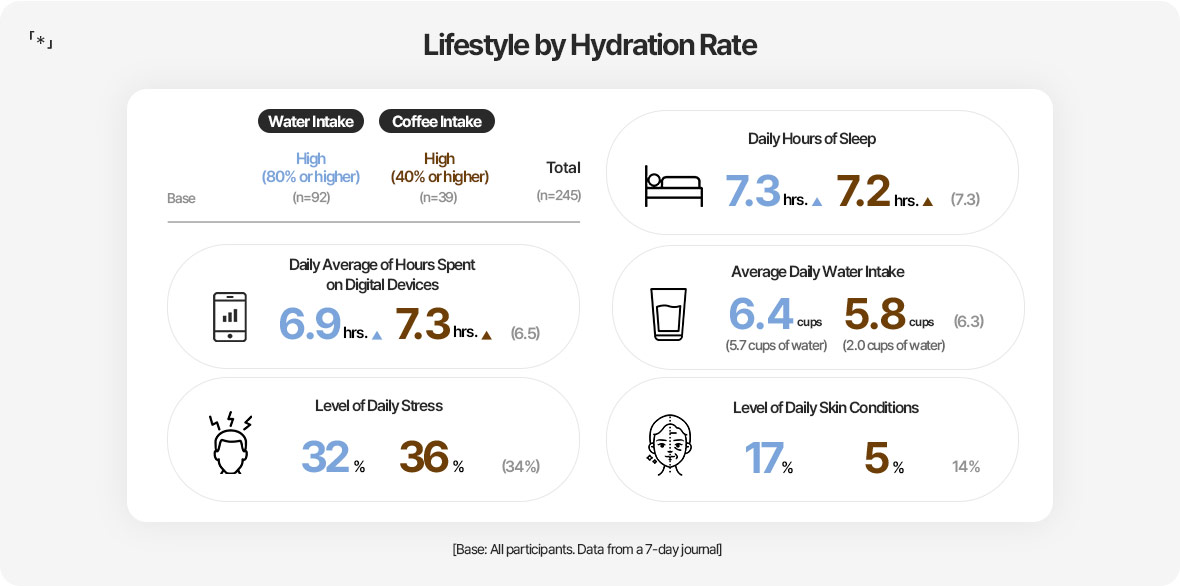
[Condition] Water Intake 80% or higher, Coffee Intake 40% or higher
- Daily Average of Hours Spent on Digital Devices : Water 6.9 / Coffee 7.3 / Total 6.5
- Level of Daily Stress : Water 2% / Coffee 36% / Total 34%
- Daily Hours of Sleep : Water 7.3 / Coffee 7.2 / Total 7.3
- Average Daily Water Intake : Water 6.4 / Coffee 5.8 / Total 6.3
- Level of Daily Skin Conditions : Water 17% / Coffee 5% / Total 14%
This pattern that progresses from the use of digital gadgets to drinking coffee and lacking sleep can often be found in today’s daily routine. However, if these habits continue, people can be exposed to redness induced by digital devices, simultaneously paired with skin troubles and dullness that come from a lack of sleep. This suggests that the skin concerns of modern women, whether it be dryness, troubles, dullness and so on, are not the result of a sole lifestyle element but are rather the work of different factors including the use of the electronics, stress, sleep deprivation and drinking coffee, and therefore the symptoms will continue to be aggravated.
![Stress, Excessive use of digital devices, Drinking coffee(Too much caffeine) Lack of sleep cause Sleep disorder / Skin dryness, Skin troubles/ sensitivity, Dullness / [Result of FGD and qualitative research (2 GF, N=8)] *Research by: Kantar Korea](/int/en/assets/image/lbll/research02_digital_07_pc_220630.jpg)
In other words, as the diagram above illustrates, using digital devices to relieve stress, then going to bed later at night, craving coffee during work due to the lack of sleep and with that coffee combined with the use of electronics affecting the quality of sleep once again, these unintentional habits have been circulating through the lifestyle routines of many causing countless skin problems including dryness. Now is the time to examine your daily routine before searching for a good cosmetics product to moisturize your skin.






